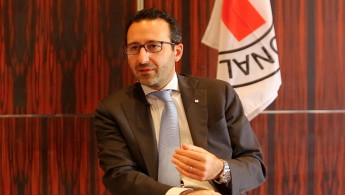Syria humanitarian work 'constrained by sectarianism', says Red Cross
The Red Cross' Middle East director has said that the warring sides in Syria's bloody civil war have politicised humanitarian work, imposing sectarian constraints on ensuring aid to besieged civilians.
Robert Mardini told The New Arab during a sit-down interview on Tuesday that the humanitarian deal that linked the fates of the rebel-held towns of Zabadani and Madaya to the Shia pro-regime towns of Foua and Kafraya had its "pros and cons".
"There were negative and positive aspects to the deal. The positives were that besieged civilians in the four towns received aid. The political deal has, of course, helped us do our job and help people whether in Zabadani, Madaya, Foua or Kafraya," Mardini said.
"However, the negatives were that it politicised humanitarian work and made it sectarian. It put restrictions on humanitarian aid based politics or the dynamics of the conflict."
Madaya and Zabadani, near Damascus, have been encircled by regime forces while Foua and Kafraya in the northwest have been besieged by hardline rebels.
 |
We are on the ground, engaging in dialogue with will all sides of conflicts for a very simple reason: to ensure humanitarian aid to the people who need our help whether that is in Syria's Aleppo, East Ghouta, Hama, Yemen's Taiz or Iraq's Mosul |  |
Rebels have sought to link the fate of the four towns, demanding that aid destined for the two loyalist towns must also go to the two opposition-held towns.
Evacuations and aid deliveries in these four besieged areas have taken place side by side in April, August and September.
Mardini also stressed that the Red Cross' main goal was to help people based on the urgency of their needs regardless of regional politics.
"We are on the ground, engaging in dialogue with will all sides of conflicts for a very simple reason: to ensure humanitarian aid to the people who need our help whether that is in Syria's Aleppo, East Ghouta, Hama, Yemen's Taiz or Iraq's Mosul.
"We have one goal and our 150 years of experience in conflict zones has proven that communication with all sides of conflicts is the only way to gain the acceptance of all sides."
He added that in spite of all horrors shown in the news and on social media of war zones the Red Cross has managed to cross the front lines of battle more than 50 times to deliver aid to besieged civilians.



